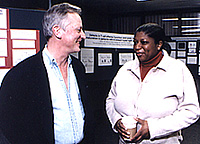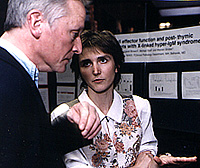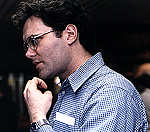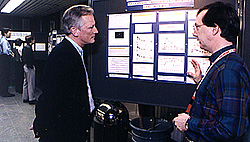![]()
Fellows Honored at Wednesday Poster Sessions
Photos by Ernie Branson
All of the excitement at the weekly Wednesday Afternoon Lecture Series is not confined to the lecture hall. Outside of Masur Auditorium, both before and after the distinguished talks by established investigators, a rising generation of sophisticated researchers gets to show their stuff.
Winners of the Fellows Award for Research Excellence (FARE), which recognizes outstanding scientific research performed by NIH fellows, are on hand to explain their posters not only to the guest lecturer, but also to attendees at the series.
 |
Wednesday Afternoon Lecturer Dr. Fred Alt of Harvard Medical School reunites with his protégée Dr. Sharon Jackson prior to the his talk Mar. 3 in Masur Auditorium. Jackson was a FARE winner in 1995 and is now an NIAID scientist. |
FARE is an annual event. Fellows submitted abstracts to the FARE 1999 competition during the summer of 1998. Abstracts were assigned to study sections and judged by panels of postdocs and senior scientists. This year, 130 of the 666 applicants were awarded with a $1,000 travel scholarship to attend a meeting within the United States during fiscal year 1999. The winners are asked to present their work during a poster session held Wednesdays in front of the Office of Special Events (Bldg. 10, Rm. 1C174). FARE winners get to choose, in most cases, which guest lecturer's talk they want to be a part of with their poster.
 |
At left, Alt looks over work presented by FARE recipient Bibiana Bielekova. At right, Bruno Gran considers the work of fellow FARE winners. |
 |
Ten FARE winners showed their work Mar. 3 in conjunction with a talk by Dr. Fred Alt of Harvard Medical School, who was at NIH to discuss "A Critical Role for DNA End-joining Proteins in Both Lymphogenesis and Neurogenesis." Among those browsing the posters was Dr. Sharon Jackson, a FARE winner in 1995 who now works in NIAID's Laboratory of Host Defenses. She was there to greet Alt, who had been her mentor at Columbia University in the mid-eighties.
|
Xiaodong Xiao (r) explains his work to Gran and Bielekova. |
 |
 |
Jay Lozier shows Alt his work on "Evaluation of the Rhesus Macaque as an Animal Model for Hemophilia B Gene Therapy." |
"He's just a real person," said Jackson. "If there's anyone responsible for me being in science, it's him."
Alt made time for all the FARE posters, interacting amicably with the presenters prior to his lecture.
 |
Shuling Zhang points out data on his project, "Cell Cycle Regulation in Plasma Cells by Allelic Variants of the Cdkn2a Locus, a Candidate Gene for Pctr1." |
Applications for FARE 2000 will be accepted starting in the late spring of 1999. The fellows committee will soon provide details on its Web site at ftp://helix.nih.gov/felcom/index.html. FARE is sponsored by the scientific directors, the Office of Education and the Office of Research on Women's Health.
Up to Top